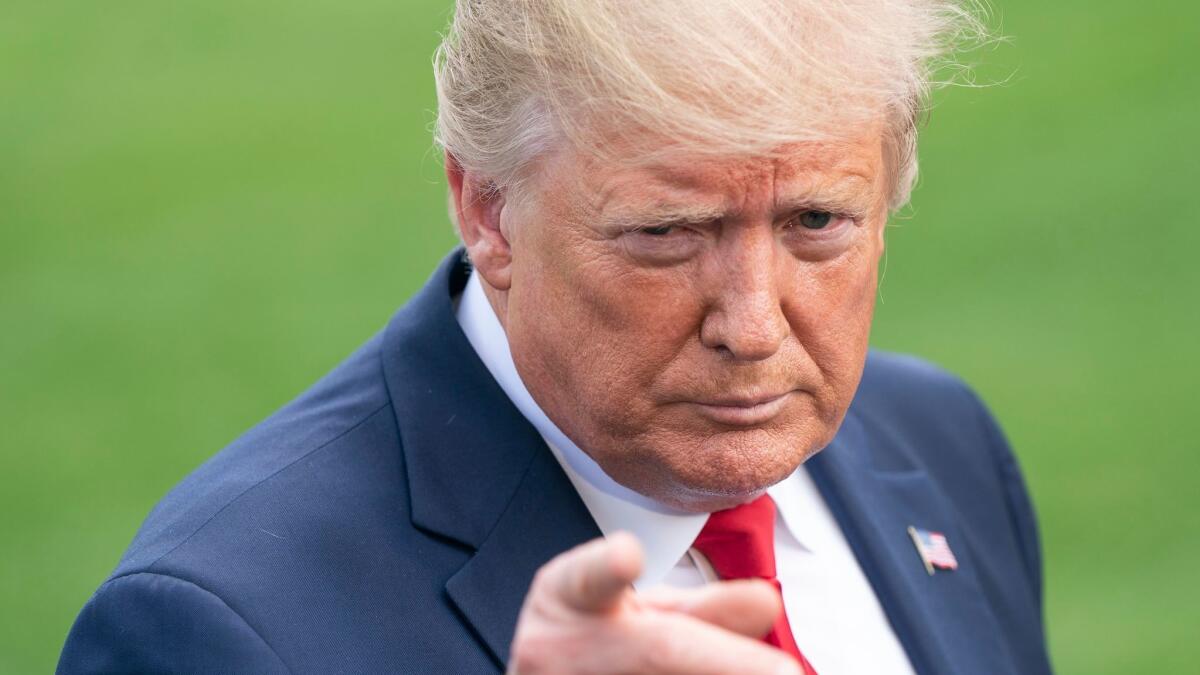Editorial: If we genuinely want to avoid conflict with Iran, Trump better find a new playbook

Secretary of State Michael R. Pompeo insisted on Tuesday that “President Trump does not want war” with Iran, even as the administration continued to blame the Islamic Republic for mysterious attacks on four oil tankers and fortified the U.S. military presence in the Middle East with 1,000 new troops.
It’s good that the administration is seeking to calm the anxiety it seemed to have been stoking. But Pompeo’s statement would be more reassuring if the administration weren’t embarked on a long-term campaign of “maximum pressure” on Iran that creates the risk of future conflict even if the current tensions subside.
The original sin of the administration’s Iran strategy was Trump’s repudiation last year of the 2015 Joint Comprehensive Plan of Action, an international agreement under which Iran dismantled most of its nuclear production infrastructure and agreed to monitoring by international inspectors. According to the International Atomic Energy Agency, Iran largely complied with the agreement. But Trump still insisted on withdrawing from what he had branded “the worst deal ever negotiated,” largely because it didn’t address other U.S. complaints about Iran’s behavior.
In reimposing sanctions on Iran, the administration made it difficult for European countries that signed the JCPOA to trade with Iran, creating strains in relations with this country’s closest allies. Now Iran says it will begin enriching uranium to higher levels next month unless European nations ensure that Iran can benefit economically from the agreement. If the JCPOA unravels, weaving it back together — or negotiating the more comprehensive agreement the Trump administration says it wants — would require a miracle.
Beyond trashing the nuclear agreement, the Trump administration has attempted to dictate to Iran how it must behave if it wants a relationship with the U.S.
The U.S. sanctions on Iran’s oil industry also look to Iranians like an attempt to bankrupt the country. The attacks on the four tankers anchored off the coast of the United Arab Emirates, if indeed they were perpetrated by Iran’s Revolutionary Guard, could be retaliation for the squeeze the U.S. is putting on Iran’s oil business. That, of course, doesn’t justify them.
Beyond trashing the nuclear agreement, the Trump administration has attempted to dictate to Iran how it must behave if it wants a relationship with the U.S. In a speech last year at the Heritage Foundation, Pompeo listed 12 “basic requirements” that Iran must meet.
Some of Pompeo’s demands addressed activities that the U.S. was right to be concerned about, including Iran’s support for militant groups such as Hezbollah and Hamas. But it’s understandable that Iran would see the speech as an onslaught of ultimatums. Nor can Iran ignore the fact that Trump has chosen as key advisors hard-liners like Pompeo and National Security Advisor John Bolton, who as a private citizen advocated regime change in Iran.
Ironically, there is one figure in the Trump administration who has flirted with a less bellicose approach to Iran: the president himself. Last month, Trump mused that if Iran reached out to him “we can make a fair deal.” Some have suggested that the president sees his experience with North Korea — in which Trump threatened “fire and fury” only to warm to Kim Jong Un — as a model for a breakthrough with Iran.
Enter the Fray: First takes on the news of the minute »
There are some suggestions that Trump’s attitude has affected the views of his advisors. Earlier this month, Pompeo said that the U.S. was ready to negotiate with Iranian leaders with “no preconditions.” He added, however, that “the American effort to fundamentally reverse the malign activity of the Islamic Republic, this revolutionary force, is going to continue.”
It’s perhaps wishful thinking to expect that Trump, with his limited attention span and laissez-faire approach to governance, will be willing to direct his administration to shift gears in its policy toward Iran. It doesn’t help that the administration’s national security team is also in disarray with the abrupt departure of acting Secretary of Defense Patrick Shanahan.
In an exchange with reporters on Tuesday, the president said: “We have a lot of things going on with Iran.” One of those things should be a new playbook for dealing with the Islamic Republic.
Follow the Opinion section on Twitter @latimesopinionand Facebook
More to Read
A cure for the common opinion
Get thought-provoking perspectives with our weekly newsletter.
You may occasionally receive promotional content from the Los Angeles Times.










